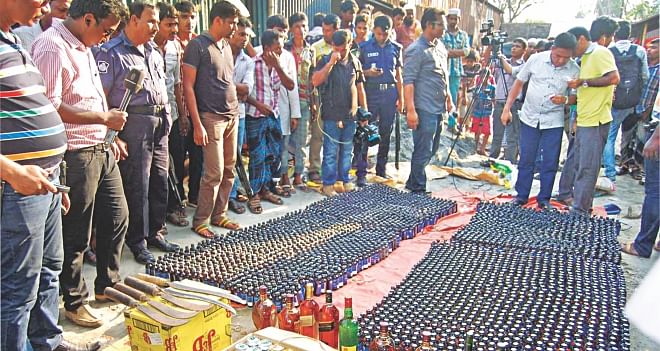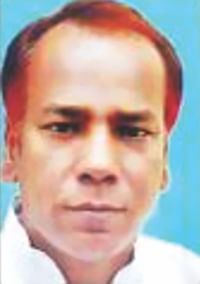Nur 'controlled' drug business

The drug empire Nur Hossain built in Siddhirganj of Narayanganj took years to build, if not decades. But it was nobody's headache although he ran the illegal trade under the nose of law enforcers and the local administration.
Hossain, the prime accused in the sensational seven-murder case, did it all openly with protection from a local "godfather" and some police officials, according to sources with firsthand knowledge.

For him, money came what the sources say like "flood waters" from the sale of Phensedyl, Yaba and local and foreign liquors. Drug trade, both retail and wholesale, made the largest chunk of his income.
Parts of the income went to some unscrupulous law enforcers and administration officials in return for the protection they gave Hossain, ward-4 councillor of Narayanganj and vice-president of Siddhirganj thana Awami League.
His drug empire spreads from Shimrail crossing, Shimrail truck stand, Siddhirganj Housing to as far as west end of Kanchpur bridge and Demra.
Over the years, the business boomed and it went on a full scale until he went into hiding on April 30 following the seven-murder in the city.
He ran the trade from his head office at the Shimrail truck stand where the transactions used to take place.
The sources said Hossain set up close circuit cameras in this office and if the footage can be collected, it will reveal who visited his office to collect their "share".
The sources include members of law enforcement agencies, locals and even aides of Hossain. They spoke on condition of anonymity to protect themselves from retribution.
In his illegal trade, Hossain went unchallenged and even came to be known as a "godfather" in Siddhirganj, where there is no other known drug trader. He maintained such a close link with law enforcement agencies that there has never been a raid in his office or any of his storehouses.
Not until yesterday when law enforcers seized 3,000 bottles of Phensedyl, 37 cans of beer, nine bottles of foreign liquor and five sharp weapons raiding several of his storehouses.
Locals said drugs were sold openly from these storehouses and other spots till April 30, the day six bodies of the seven abductees were found floating in the Shitalakkhya river.
Contacted, Mohammad Zakaria, additional superintendent of police (SB) in Narayanganj, said he joined the office three months ago and was not aware of any raid in Hossain's office.
"I cannot speak about other matters," he said, when asked about the allegation that some law enforcers protected Hossain's business in exchange for money.
Across Siddhirganj, Nur Hossain set up or rented at least 20 shops to store various drugs.
"Ask anyone in the area, and he will tell you how openly the illegal trade was run for years under the nose of law enforcement agencies," said a tea vendor at Shimrail truck stand.
At this stand alone, about 10,000 truck drivers and helpers gather every day. Most of these drivers and helpers are Hossain's regular customers, the sources said.
A truck helper claimed to have seen uniformed police and Rab members visit Hossain's office there several times.
The drugs, hidden among other goods, come from Comilla in trucks.
The sources said Hossain's cousin Nasir alias Kala Nasir used to look after the business. Several groups were assigned to ensure the smooth operation of the trade and collect the money. Even some women were engaged in carrying drugs in the area.
"The points of sale, known as counters locally, would remain open for 24 hours," a trader at Shimrail crossing told our Narayanganj correspondent.
"Hossain's cadres, who always carried firearms, kept eyes on customers. Cops were not a problem for them, but they were watchful about their rivals," the trader added.
Hossain and his aides had both legal and illegal firearms, and they used those in drug peddling, extortion and other illegal activities.
Last week, the authorities cancelled licences of 11 firearms of Hossain and his associates.
For long, Narayanganj has come to be known as a crime-prone area infamous for drug trade, extortion and tender business. In recent years, it turned into a commonplace for abduction for money as well.
Hossain had political rivalry with Nazrul Islam, panel mayor of Narayanganj City Corporation. The two also had a fierce competition over winning government tenders, according to the sources.
On April 27, seven people -- Nazrul Islam and his four associates and senior lawyer Chandan Sarker and his driver -- were kidnapped separately, but around the same time from the Dhaka-Narayanganj link road.
Six bodies were found in the Shitalakkhya river three days later and another the next day.
Nazrul's father-in-law Shahidul Islam on Sunday alleged that Rab men killed Nazrul in exchange for Tk 6 crore from Nur Hossain and other accused.
Three top officials of Rab-11 were fired over their alleged involvement in the crime.
The three are Lt Col Tareque Sayeed Mohammad, Maj Arif Hossain and Lt Commander SM Masud Rana.
Tareque was the commanding officer of Rab-11 in Narayanganj when the abductions and killings happened. He is also the son-in-law of Disaster Management and Relief Minister Mofazzal Hossain Chowdhury Maya.
Shahidul later said a son of an influential AL lawmaker brokered the deal between Hossain and the Rab men. The Daily Star could not independently verify the claim and therefore kept from naming the AL lawmaker and his son.
Meanwhile, Lt Col Anwar Latif Khan was appointed as commanding officer of Rab-11 yesterday.
His appointment came only a day after 83 cops of Siddhirganj and Fatullah police stations and detectives of Narayanganj were transferred.
'DON'T KILL NUR HOSSAIN'
Shahidul yesterday called for not putting Nur Hossain in crossfire.
Talking to journalists at his house in Narayanganj, he said he feared Hossain might be killed to hide the facts.
"The culprits will remain out of reach if Nur Hossain is killed in crossfire. But we want to know the truth."

 For all latest news, follow The Daily Star's Google News channel.
For all latest news, follow The Daily Star's Google News channel. 



Comments